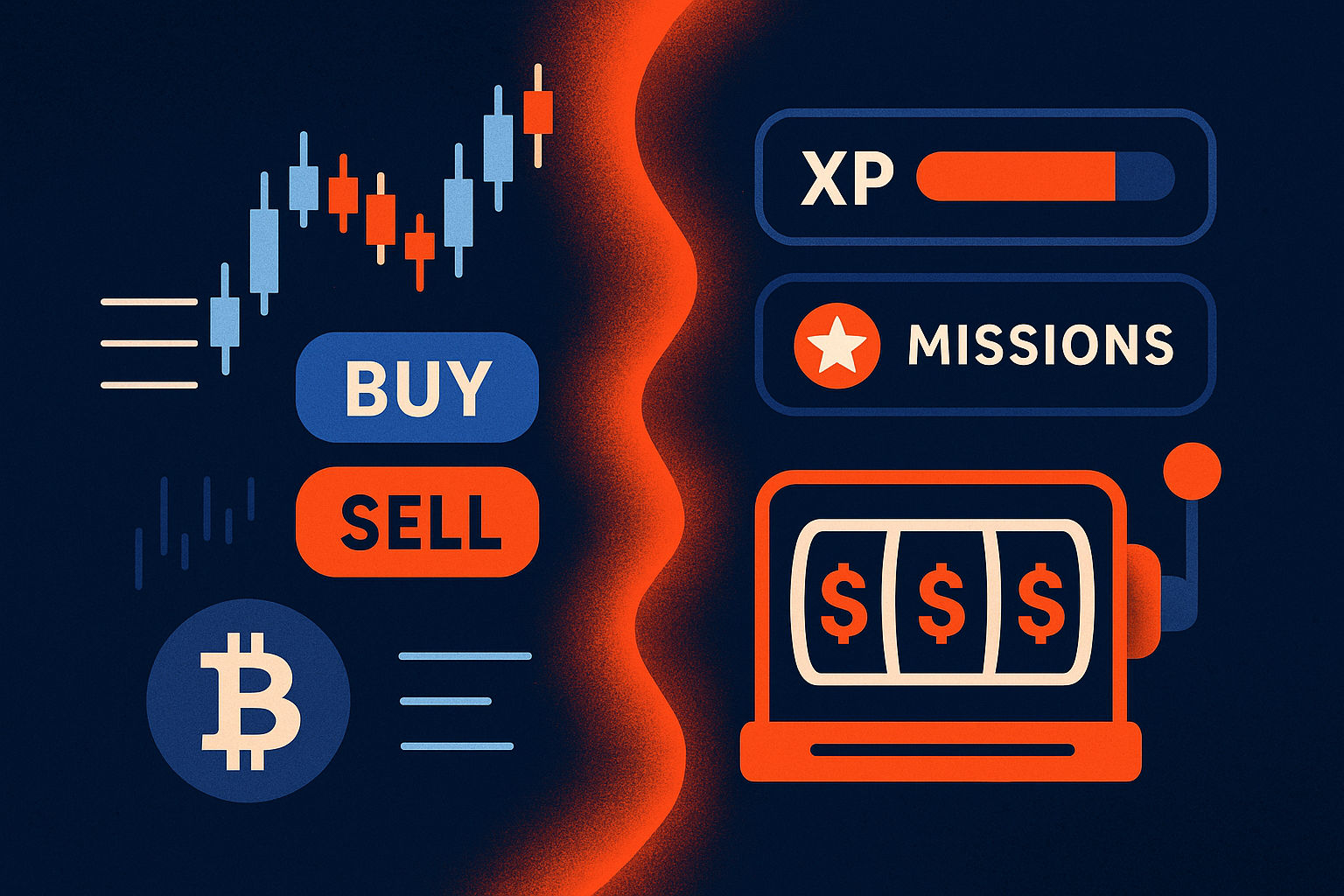Gamified crypto is spilling into sweepstakes casinos – and it is getting harder to tell where trading ends and gaming begins.
In the past two years, big exchanges and wallets have rolled out “missions”, point systems, and quest hubs to pull retail investors into higher engagement.
At the same time, a wave of U.S. sweepstakes casinos has gone live with the same playbook: daily tasks, XP ladders, login streaks, and VIP tiers sitting on top of dual-currency prize models (source).
Now a new entrant, Stackz, wants to bring a GameFi-style progression system to that sweepstakes niche – without issuing a token – raising fresh questions about how far gamified finance should go.
Bankless Times takes a closer look at what is driving this crossover and what it means for crypto users.
Gamification moves from meme stocks to crypto – and now casinos
Gamification has become a core design tool in retail finance apps. Academic work over the last year describes a shift toward “gamblified finance”, where trading platforms resemble high-stakes mobile games (source).
Several strands have converged:
- Quest-based trading on exchanges: Major exchanges now run challenge hubs where users earn vouchers or fee discounts for completing tasks like making a first trade, staking a token, or trying a new product vertical. Industry commentary points to Binance’s “Missions” and similar daily challenge systems on OKX and Bybit as examples of this shift.
- Learn-to-earn and points farming: Web3 “quest platforms” and learn-to-earn campaigns offer token rewards for interacting with dapps or watching tutorials. These campaigns combine education with bounties and now sit alongside broader token and airdrop strategies.
- Impact on real behaviour: A 2024 randomized experiment on trading gamification found that adding hedonic elements such as confetti and badges increased trading volume by about 5.17 percent on average, with lower-literacy investors especially drawn to such features (source). Separate research on brokerage app “gamified updates” suggests cumulative increases in retail traded volume of around 21 percent, but with significantly worse average returns for those users (source).
Crypto has been an early adopter. GameFi daily active users passed one million in the first quarter of 2025, up from roughly sixty-three thousand in 2021, according to recent market analysis.
But the crash after the 2021–22 hype cycle revealed how fragile these models can be. A year-end report from ChainPlay found that around 93 percent of GameFi projects launched in the last cycle are now classified as “dead”, with token prices down more than 90 percent and fewer than 100 daily users.
That combination – strong user pull, poor long-term outcomes – mirrors concerns regulators now raise about aggressive gamification in investment apps.
Sweepstakes casinos adopt the dual-currency, mission-driven model
While crypto has been wrestling with these dynamics on-chain, U.S. sweepstakes casinos have been quietly building their own gamified ecosystems off-chain.
Unlike traditional online casinos, sweepstakes sites operate with a dual-currency system:
- Gold Coins or similar – virtual tokens bought or received for free, used purely for gameplay and entertainment, and not redeemable for cash;
- Sweeps Coins or prize coins – promotional tokens granted as a bonus when users acquire Gold Coins or through free entry methods such as mail-ins, which can be used on the same games, with wins redeemable for cash or gift cards once identity checks and minimum thresholds are met.
Recent launches highlight how aggressively this sector now leans on gamified layers:
- LoneStar Sweepstakes Casino, which went live in March 2025, offers daily login rewards, a tiered VIP program, and multiple ways to earn virtual currencies without mandatory purchases, on top of a 500-plus game library.
- SpinBlitz, a 2024 rebrand of Scratchful, promotes itself as the “Home of Free Spins” and pairs thousands of slot games with referral bonuses, social media promotions, and consistent daily rewards.
- Newer names like Dara Casino and Jackpota follow the same pattern: sizable no-deposit Gold Coin and Sweeps Coin packages on signup, ongoing login bonuses, and layered promotions to keep players in the loop.
Underneath the promotional wrapping, the logic is similar to crypto quest hubs:
- Give users a free starting package of non-redeemable coins.
- Introduce a prize currency with clear redemption rules.
- Use missions, levels, and streaks to build daily habits and longer sessions.
Where crypto might offer a “trade three times this week to earn points”, sweepstakes casinos frame it as “complete three missions to boost your level and earn extra prize entries”.
Stackz bets on GameFi-style progression without a token
Into this crowded field comes Stackz Casino, a forthcoming sweepstakes casino brand positioning itself explicitly around GameFi-inspired progression rather than one-off bonuses.
According to internal product documentation shared with partners, Stackz plans to launch with:
- XP-based levels: Every spin and mission completion feeds into a visible experience bar. Level-ups grant stronger daily rewards and access to higher-tier events instead of only short-lived promos.
- Daily and weekly missions: Rotating quests nudge players toward behaviours such as logging in, trying new games, or hitting modest wager milestones, with rewards paid in Gold-style play coins, prize coins, and XP.
- Streaks and login ladders: Consecutive days of activity trigger streak bonuses, with resets if a day is missed, echoing common mobile game patterns.
- Tiered loyalty and VIP structure: Levels roll into named loyalty tiers, which then unlock better redemption limits, faster customer support, and tailored offers.
- Arena-style events: Time-boxed “Arena” competitions are planned, using prize coins as reward pools and ranking players on mission completions or in-game results.
Unlike many GameFi projects, Stackz is not issuing a native token. Progress, rewards, and status all sit within the closed sweepstakes economy, with cash-out restricted to prize balances and subject to standard KYC and minimum redemption thresholds.
For crypto-native users, that model will feel familiar: the same dopamine loops as a DeFi dashboard or points farming campaign, but routed through off-chain prize coins instead of tradeable tokens.
Why regulators care about “gamblified finance”
As this crossover deepens, legal scholars and regulators in both the United States and Europe have started to focus on where engagement ends and manipulation begins.
A comparative study on the gamification of investments, published in November 2025, argues that while quests and badges can make finance more intuitive, they also risk pushing inexperienced users toward excessive trading and complex products they do not fully understand (source).
These concerns are now bleeding into crypto and GameFi, where on-chain markets, NFT drops, and leveraged products sit one tap away from quest hubs and points chases.
Sweepstakes casinos, although operating under a different legal framework, face related questions. Responsible gaming guidelines highlight the risk that missions, streaks, and leaderboards can lengthen sessions and make it harder for vulnerable players to stick to budgets, even when the front end talks about “free” coins.
Stackz and its peers will need to show not just how well their systems retain users, but how clearly they communicate boundaries between entertainment and financial risk.
What this means for crypto users
For Bankless Times readers, the practical implications sit in two places: personal behaviour and expectations of platforms.
At a personal level
Whether the app on screen is a sweepstakes casino, a GameFi title, or a trading platform, the mechanics are increasingly the same:
- Visible XP bars and levels signal that the product is designed for long-term engagement, not occasional use.
- Daily streaks and missions are intended to make absence feel like loss.
- Leaderboards and referral races tie status to activity, not outcomes.
When a sweepstakes brand like Stackz markets itself to crypto enthusiasts, it is leaning on those familiar cues. Users who already juggle token farming, NFT drops, and exchange quests may be more vulnerable to “just one more spin” than they realise.
The safest rule of thumb is to treat any casino-style app as pure entertainment spend. The prize currency, no matter how it is framed, should not be part of a wealth-building strategy.
At a platform and policy level
On the builder side, sweepstakes design holds a few lessons for crypto projects trying to stay on the right side of both regulators and users:
- Keep currencies clear: Sweepstakes rules force operators to separate fun coins from prize coins, and to spell out redemption paths in plain language. Crypto apps can apply the same discipline to demo modes, on-chain risk, and off-chain rewards.
- Tie quests to education, not leverage: There is growing pressure on trading apps not to reward high-risk actions with confetti and badges. For crypto and GameFi teams, connecting missions to tutorials, security checks, or long-term behaviours looks more sustainable than incentivising high-frequency trading.
- Build in brakes, not just accelerators: Self-exclusion, timeout tools, and configurable limits are increasingly standard on regulated gaming sites. As “bankless” finance converges with game mechanics, similar controls may become an expectation on any app that deals with real capital.
The bigger picture
GameFi’s rapid rise to more than a million daily users – and the collapse of most of its first wave – shows how quickly gamified systems can attract and then burn through attention.
Sweepstakes casinos are now adopting that same playbook, while crypto exchanges and wallets weave it into trading and staking.
Stackz sits at the intersection: a sweepstakes casino built from day one with a GameFi-style progression engine, pitched at exactly the kind of crypto-native audience that Bankless Times serves.
For readers, the trend carries a simple message. The lines between trading, gaming, and gambling are blurring. Understanding how XP bars, missions, and streaks are designed – and who they truly benefit – is becoming just as important as understanding tokenomics or smart contracts.













